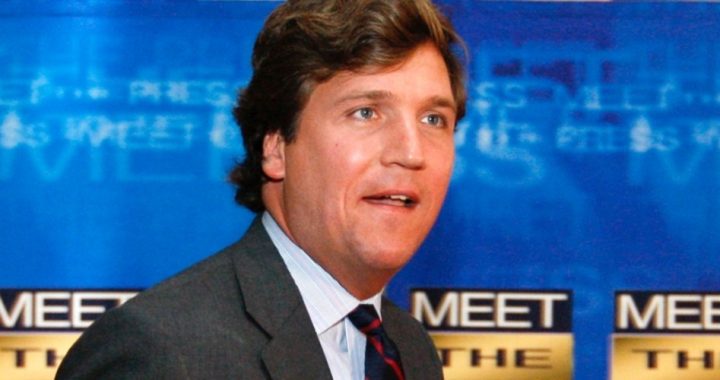
The replacement of Megyn Kelly with Tucker Carlson (shown) at Fox News Channel (FNC), known for its generally neoconservative political slant, may signal a shift in that image. An outspoken non-interventionist in foreign policy and a supporter of Ron Paul’s 2008 presidential campaign, Carlson will take over the 9:00 p.m. ET slot on FNC’s nightly programming.
Kelly stated upon her departure from FNC, “I have agreed to join NBC News, where I will be launching a new daytime show Monday through Friday, along with a Sunday evening news magazine program. I will participate in NBC’s breaking news coverage and its political and special events coverage.”
While she described her exit at Fox as a way to spend more time with her family (she has three young children with second husband Douglas Brunt), Kelly had previously expressed disappointment in what she considered a lack of support from fellow FNC star Bill O’Reilly after her famous debate confrontation with presidential candidate Donald Trump. In the August 2015 Fox News-sponsored Republican primary debate, Kelly provoked a memorably strong response from Trump after she brought up his past comments about women. She later reacted to Trump’s comments by saying she would not apologize “for doing good journalism.”
That led to Trump boycotting the Iowa Republican debate on January 28 because Kelly would be the moderator. Off-camera, Kelly compared Trump to Voldemort (the villain of the Harry Potter series). Later, after it became apparent that Trump would win the Republican Party nomination, Kelly met with him at Trump Tower in an effort to “clear the air” with the Republican nominee.
Kelly, like Trump, is a native New Yorker, who received a degree in political science from Syracuse University in 1992 and a law degree from Albany Law School. After a stint at a Chicago law firm, she moved in 2003 to Washington, D.C., to work as a general assignment reporter for a local ABC television affiliate. The next year, she was hired by Fox News, where she spent the next 12 years in various roles.
In October of 2013, Kelly landed the 9:00 p.m. ET time slot, sandwiched between FNC’s two network stars Bill O’Reilly and Sean Hannity. Her show, The Kelly File, did well in the ratings, even faring better at times than either O’Reilly or Hannity.
She describes herself as an “independent” in politics, voting sometimes for Democrats and other times for Republicans.
Tucker Carlson, on the other hand, has always been known as a Republican, although not always predictable in his political views and certainly not in lock-step with the more interventionist positions usually taken by other FNC hosts such as Hannity (who remains a strong advocate of the decision to invade Iraq in 2003). From early in his TV career, Carlson has been much more skeptical of such military adventures. For example, appearing on CNN’s Crossfire in the late 1980s, he questioned the decision of the United States to get involved in World War I. Yet, he initially supported the Iraq War, although he soon changed his position. He told The New Yorker, “I think it’s a total nightmare and disaster, and I’m ashamed that I went against my own instincts in supporting it. It’s something I’ll never do again. Never.”
His feelings about the Iraq War were so strong, in fact, that he refused to vote in the 2004 election between President George W. Bush and Senator John Kerry. He was also disillusioned with how Bush had moved the Republican Party away from its image as a small-government party.
Carlson’s negative comments against Bush caused some Republicans to question whether he was disloyal and not a real conservative. Arguing that Bush was the one who was not a true conservative, Carlson told the Washington Post, “I don’t know what you consider conservative.… For instance, I’m utterly opposed to abortion, which I think is horrible and cruel. I think affirmative action is wrong. I’d like to slow immigration pretty dramatically. I hate all nanny state regulations, such as seat belt laws and smoking bans. I’m not for big government. I think the U.S. ought to hesitate before intervening abroad. I think these are conservative impulses.”
Perhaps the strongest evidence that Carlson may not be a typical FNC host was his support for then-Texas Congressman Ron Paul for president in 2008. After Paul’s attempt to obtain the Republican nomination for president failed, Carlson served as master of ceremonies in Minneapolis for the Ron Paul Campaign for Liberty Rally for the Republic.
The next year Carlson became a senior fellow at the CATO Institute, a libertarian think-tank.
Carlson’s father, Richard Warner Carlson, was U.S. ambassador to the Seychelles, and later director of the Voice of America. Tucker studied history at Trinity College in Hartford, Connecticut, and began his career in journalism with Policy Review, a national conservative journal then published by the conservative think-tank the Heritage Foundation. He later worked for the Arkansas Democrat-Gazette newspaper in Little Rock, then wrote for The Weekly Standard (a neoconservative publication). Other publications for which he wrote include Reader’s Digest, Esquire, and The Daily Beast.
Carlson came to national attention when he joined CNN as co-host of The Spin Room, with Bill Press. He later took over the “(Pat) Buchanan” chair as co-host of Crossfire, until that network decided to drop the program. After leaving CNN, Carlson worked at MSNBC; however, after three seasons, the network moved to the Left and replaced his 6:00 and 9:00 p.m. ET slots with two liberals, Ed Schultz and Rachel Maddow. Carlson summed up the political change at MSNBC by saying, “[They no longer had] a role for me.” Or any other conservative, apparently.
From there, Carlson has worked in various roles with Fox News, including Fox and Friends, Red Eye with Greg Gutfeld, and Special Report with Brett Baier. While working for FNC, Carlson launched a new political news website, The Daily Caller. Carlson was editor-in-chief of the site, which he described as not tied to any particular ideology but rather to “breaking stories of importance.”
On November 14, 2016, Carlson took over the 7:00 p.m. ET nightly slot on FNC, replacing Brit Hume, who had temporarily hosted the time slot following the departure of long-time FNC figure Greta Van Susteren. After holding that slot for less than two months, but doing very well in the ratings, Carlson was handed the Kelly time slot by FNC.
Early in his career, Carlson was well known for wearing bowties, but gave up doing so in 2006. He said that while he still liked wearing a bowtie, he had found that it opened him up to “scorn and ridicule.” He added with his typical wit that his decision to start wearing long ties was “not a political statement. I didn’t ditch the bow tie in protest or in solidarity with any oppressed group.”
The influence of the Fox News Channel on many Americans with conservative leanings is considerable. For example, its strong support for the invasion of Iraq in 2003 was critical in encouraging average Republicans to support that disastrous action.
Hopefully, Carlson’s replacement of Kelly will be an improvement at FNC in the areas of support for constitutionalism, limited government, and non-interventionism.
Photo: AP Images



